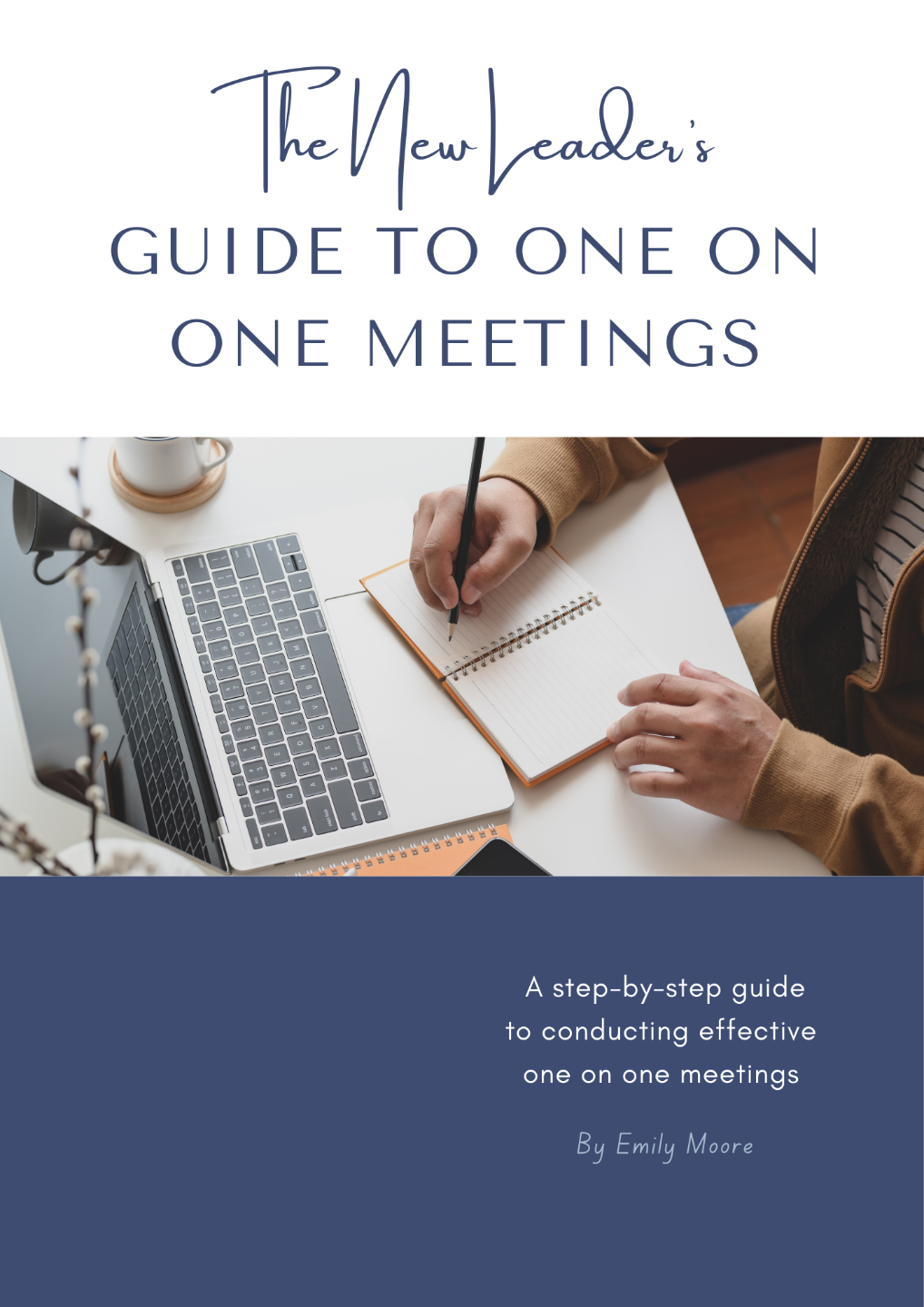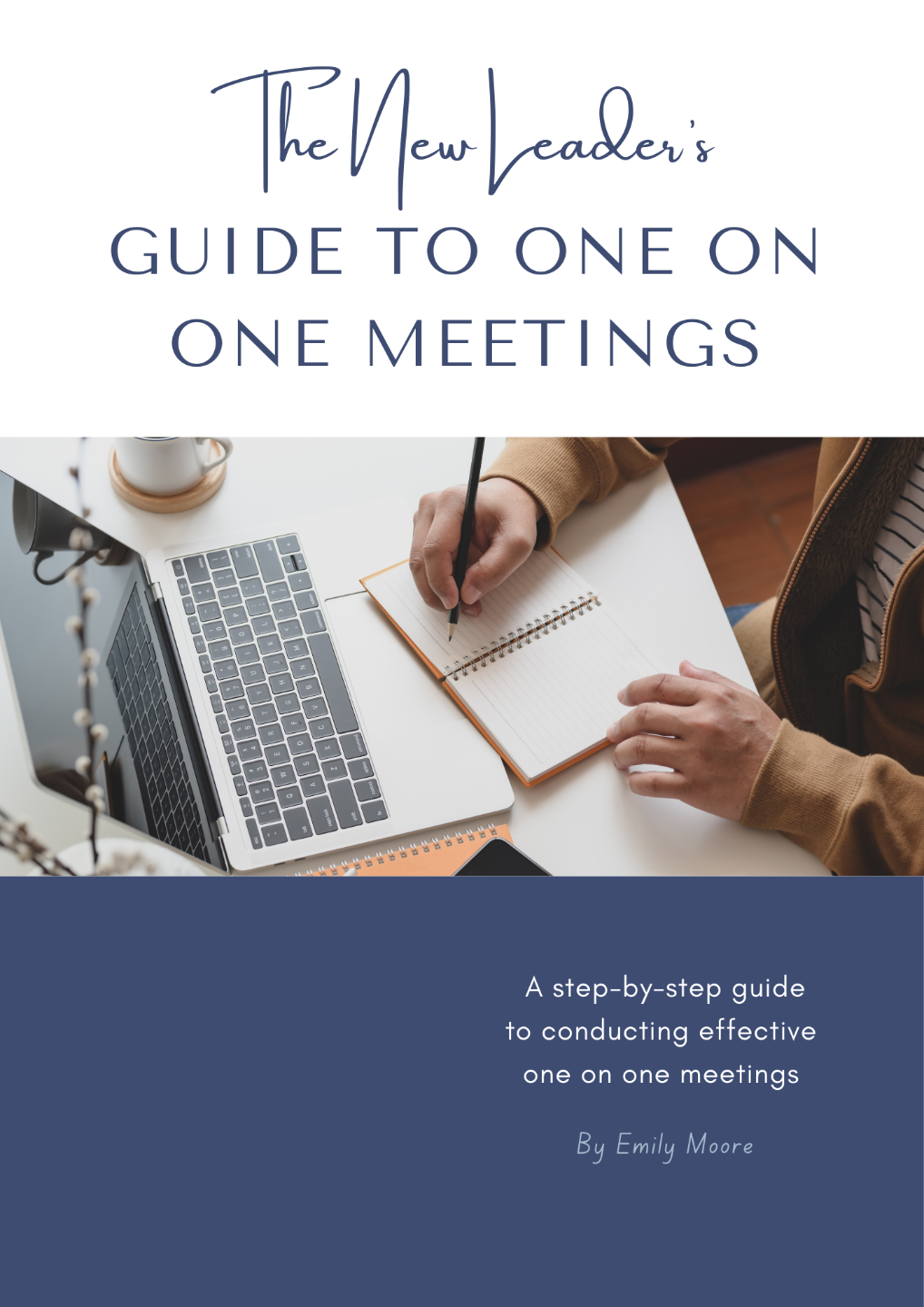
Why One on One Meetings are Essential for New Managers
Oct 01, 2024
Do you want to make the BEST first impression as a new manager?
Do you want to know exactly what support your new team needs?
Of course you do!
Well if you are a new or a first-time manager, which I’m guessing you are since you are here reading this post, I can't think of a better way to make a really solid first impression and getting started on the right track, than by having one-on-one meetings with your team.
I really, truly can't say enough good things about having one-on-one meetings with your team members. There are so many benefits and they are truly foundational to being an effective leader.
When you start to have these meetings regularly, you’ll find…
- you get a wealth of information as to what's happening, what they're working on, what the support they need, etc.
- a more efficient route to establishing and maintaining a solid relationship with your team members.
- you'll really have your finger on the pulse as to what's happening with not only individual team members, but also the team as a whole.
- this is the perfect environment to fine-tune your communication skills and practice giving effective feedback.
- these meetings play a key role in you establishing yourself as an effective new leader.

But the benefits don’t stop there! Keep reading to discover the 5 reasons you need to be having regular one-on-one meetings with your team
One
Allows you Dedicated Time for Communication
Number one on the list is communication, because communication is always number one 😊
I could really just end the list right here. Communication is that important.
But you know that. By now you know how important communication is in all your relationships.
And you likely have an example in the back of our mind of a time when you didn't have good communication, when it wasn't optimal, or maybe there was a complete lack of communication.
You’ve seen firsthand the impact of poor communication and you know you're not going to be *that* manager. Nope, that won't be you.
And a big piece of the communication pie is having the dedicated time set aside to meet with your team. You have this time blocked off in your very busy schedule, so you're not going to miss an opportunity to touch base with your team members about what’s happening in their world.
These meetings are your team’s opportunity to have your undivided attention to go over any feedback/ideas/questions/concerns, if there's support or resources that they need from you, or anything else they feel they need to discuss with you.
This is their time to talk about what’s on their mind.
And I can't stress that point enough. This is their meeting.
Now of course their will be two-way conversation and it’s completely appropriate for you to give feedback and direction (that is still your job after all), but the key distinction is these meetings are employee led. You will be discussing topics your team members want to discuss.
It's their time to speak and it's your time to listen.
Two
Allows you the Opportunity to Offer Personalized
Support and Career Development.
As you start to have your meetings more regularly, you'll start to build rapport, you'll start to build trust, you'll start having really meaningful conversations with each of your team members.
And what's going to come to light are the career goals they each have and where they'd like to see their career in one, two, five years from now. Any areas they are strong in, show natural talent, or have a heightened interest in will also start to come out in your conversations during these meetings.
This information is gold!
That information is going to allow you to create a personal development plan or simply tailor your coaching approach to their needs and goals. This may look like one-on-one coaching and mentoring from you, partnering them up with someone else (i.e. shadowing), or enrolling them in third party coaching or courses.
When you start to have the conversations around offering personalized support specific to areas your team members are interested in, have a natural talent, and actually want to learn, that will go so far towards their engagement, loyalty, and productivity.
Three
Allows you to Intervene Early if Needed.
Similar to my last point where areas of strength, talent, and interest will naturally come to light, so will areas where someone on your team may be struggling, having some challenges, and may need a little bit of extra coaching or support.
There may also be some conflict brewing between team members. You will likely start to get hints of those situations in these meetings.
So if you’re having these meetings regularly, you will start to see hints of these types of issues starting and be able to address them early before they become a bigger issue.
With employee conflict, you want to intervene and handle it as soon as you're made aware of it. Employee conflict can gain traction fairly quickly depending on what the situation is, and it’s far easier to address it early before it escalates.
You also want to address any issues with underperforming team members fairly quickly. When a team member is struggling and it’s starting to show in their performance, this can start to have a ripple effect out to the rest of the team, causing frustration, embarrassment, and disengagement. You may need to offer additional coaching or mentoring to help them improve their performance.
Whether it’s performance or conflict, when you intervene early there may be times you’re able to resolve the issue simply by bringing it to their attention and providing gentle coaching vs. dealing with it after it escalates and becomes a bigger issue.
Four
Allows you the Opportunity to Clarify your Expectations
Whether it's specific to a project, a policy/procedure/process change, or maybe you’re working with a new employee, there comes a time at some point you will need to clarify your expectations or some one on your team will ask for clarity on what’s expected of them.
What's great about these meetings is it is that it’s a nice, private, calm environment where your employees should feel comfortable asking these questions and seeking clarity (versus a meeting or group scenario where someone might not want to raise their hand and ask a question).
You may also find that the same questions are popping up during your individual meetings and this will allow you to provide clarity to the whole team if needed, maybe in a group message or email, and ensure everyone is on the same page.
There will always be a need for clarity. Some of that comes with communication styles, workloads, mental capacity…there are a number of things can effect what and how your team members hear and retain information. So don’t worry if you find you have to clarify your expectations, this happens at all levels of leadership.
Five
Allows Time to Celebrate Wins and
Enhance Employee Engagement.
If it's not clear by now there are many benefits that come along with having regular one-on-one time with your team members (told ya 😊) and I saved the fun one for last.
When you commit to having these meetings (and I mean consistently make them a priority) you show a commit to your team’s well-being, which is *chef’s kiss* a big boost to morale and engagement. And when you're engaging with your team and celebrating their wins, that's a major boost to morale, engagement, loyalty, productivity.
And if during your one-on-one meetings you get to celebrate the wins, small, medium, or large, that's the stuff that makes our job worth it. Let’s be honest, leadership can be tough so when we get these moments where we get to celebrate the positive, then take it!
Click here for my Guide to One-on-One Meetings that goes into further detail on how to conduct these meetings effectively, along with some helpful prompts for the actual conversation.
If you are not already having regular one-on-one meetings with your team, I really encourage you to start and to start the right way.
My last piece of advice would be this, make sure you go in with the right intent and the right understanding of how one-on-one meetings should be conducted.
What I would hate to see happen is they become something where you just go through the motions like it’s another item on your to-do list or it becomes a status update/performance review type meeting. If that starts to happen, you'll find your lose engagement fairly quickly with your team members and then it becomes something both parties start to dread and they will become ineffective or stop happening all together. And that's not what I want because that's in the end of the day that that's going to affect your credibility as their leader.
Have you started having one on meetings with your team yet? Are you finding them helpful or dreadful? Let me know in the comments!
Happy Leading!
Emily


